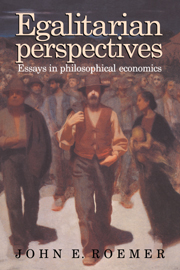Book contents
- Frontmatter
- Contents
- Acknowledgments
- List of sources
- Introduction
- Part I Exploitation
- Part II Equality of resources
- Part III Bargaining theory and justice
- Introduction to Part III
- 9 The mismarriage of bargaining theory and distributive justice
- 10 A challenge to Neo-Lockeanism
- 11 Informational complexity in axiomatic models: benefits and costs
- 12 Distributing health: the allocation of resources by an international agency
- Part IV Public ownership and socialism
- References
- Index
10 - A challenge to Neo-Lockeanism
Published online by Cambridge University Press: 23 December 2009
- Frontmatter
- Contents
- Acknowledgments
- List of sources
- Introduction
- Part I Exploitation
- Part II Equality of resources
- Part III Bargaining theory and justice
- Introduction to Part III
- 9 The mismarriage of bargaining theory and distributive justice
- 10 A challenge to Neo-Lockeanism
- 11 Informational complexity in axiomatic models: benefits and costs
- 12 Distributing health: the allocation of resources by an international agency
- Part IV Public ownership and socialism
- References
- Index
Summary
Neo-Lockean inequality
The Neo-Lockean justification of the highly unequal distribution of income in capitalist societies is based upon two key premises: that people are the rightful owners of their labor and talents, and that the external world was, in the state of nature, unowned, and therefore up for grabs by people, who could rightfully appropriate parts of it subject to a ‘Lockean proviso.’ The argument is presented by Nozick (1974). Counter-proposals to Nozick's, for the most part, have either denied the premise that people should morally be viewed as the owners of their talents, or have challenged Nozick's Lockean proviso.
Rawls, and to a more limited extent Ronald Dworkin, deny self-ownership. As Rawls writes: ‘… the difference principle represents, in effect, an agreement to regard the distribution of natural talents as a common asset… The naturally advantaged are not to gain merely because they are more gifted, but only to cover the costs of training and education and for using their endowments in ways that help the less fortunate as well. No one deserves his greater natural capacity nor merits a more favorable starting place in society.’ Behind the Rawlsian veil of ignorance, those who deliberate about justice are deprived of knowledge about characteristics whose distribution is morally arbitrary. In Dworkin's proposal for resource egalitarianism, agents calculate the insurance policy they would hypothetically ask for, were they denied knowledge of what talents they will draw in the birth lottery.
- Type
- Chapter
- Information
- Egalitarian PerspectivesEssays in Philosophical Economics, pp. 219 - 230Publisher: Cambridge University PressPrint publication year: 1994



